 Obviously when you’re talking about the greatest TV anime ever, you could say it about a lot of episodes – but it’s these transition eps that really separate Seirei no Moribito from the pack. In so many series – even really good ones – they can be breather episodes in a non-great sense. But with Moribito the characters are so well-drawn and the writing and direction so exemplary that these are arguably the best of the entire series. Of course it’s impossible to minimize the greatness of eps like #3 (and the next one after this), which are truly blockbusters. But when Seirei no Moribito slows down and looks deep, fascinating details are always revealed.
Obviously when you’re talking about the greatest TV anime ever, you could say it about a lot of episodes – but it’s these transition eps that really separate Seirei no Moribito from the pack. In so many series – even really good ones – they can be breather episodes in a non-great sense. But with Moribito the characters are so well-drawn and the writing and direction so exemplary that these are arguably the best of the entire series. Of course it’s impossible to minimize the greatness of eps like #3 (and the next one after this), which are truly blockbusters. But when Seirei no Moribito slows down and looks deep, fascinating details are always revealed.
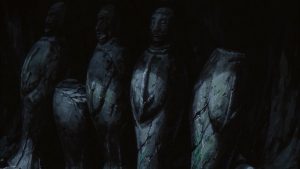 “Trust” is muttered early-on in this episode, and it’s a very important theme. We can see Balsa quite frankly struggling with this side of being a parent. It’s the first time Chagum has really challenged her authority, and to be honest I don’t think she handles it especially well. She’s dismissive of Chagum’s pain and his anxiety – perhaps not intentionally, but this is probably all she knows. Jiguro was obviously a tough love sort of parent, and that’s what Balsa falls back on when things get rocky – she assumes this is the right way, especially where raising a boy is concerned.
“Trust” is muttered early-on in this episode, and it’s a very important theme. We can see Balsa quite frankly struggling with this side of being a parent. It’s the first time Chagum has really challenged her authority, and to be honest I don’t think she handles it especially well. She’s dismissive of Chagum’s pain and his anxiety – perhaps not intentionally, but this is probably all she knows. Jiguro was obviously a tough love sort of parent, and that’s what Balsa falls back on when things get rocky – she assumes this is the right way, especially where raising a boy is concerned.
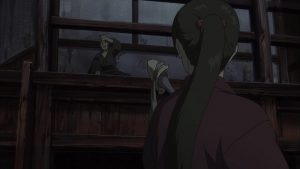 The dynamic here is really interesting, because Tanda clearly disagrees with Balsa’s methods but doesn’t feel it’s his place so stand up to her. When he offers to carry the exhausted Chagum why does Balsa feel the need to object? With everything Chagum is going through a little kindness would go a long way, but that’s not Balsa’s way. It falls to Torogai, in fact (who’s proven herself a lot more sensitive than her demeanor suggests) to pretend to be lost in order to buy the boy some time to rest. She also brings back some food for Tanda to prepare, complete with snake still attached.
The dynamic here is really interesting, because Tanda clearly disagrees with Balsa’s methods but doesn’t feel it’s his place so stand up to her. When he offers to carry the exhausted Chagum why does Balsa feel the need to object? With everything Chagum is going through a little kindness would go a long way, but that’s not Balsa’s way. It falls to Torogai, in fact (who’s proven herself a lot more sensitive than her demeanor suggests) to pretend to be lost in order to buy the boy some time to rest. She also brings back some food for Tanda to prepare, complete with snake still attached.
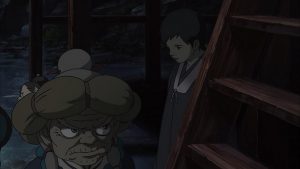 Meanwhile the Hunters (with Shuga’s help) have more or less deduced where Balsa might be headed, even without finding the map. It seems finally to have gotten past Shuga’s blinders that it may be better to consider Balsa as an ally than an enemy. They both share a goal – keeping Chagum alive – and she seems to know more about how to do it than he does. Balsa, Tanda, Torogai and the Prince trek deeper into the Eastern mountains, as the Hunters split up to search for them, checking off potential destinations one by one until only Toumi Village remains.
Meanwhile the Hunters (with Shuga’s help) have more or less deduced where Balsa might be headed, even without finding the map. It seems finally to have gotten past Shuga’s blinders that it may be better to consider Balsa as an ally than an enemy. They both share a goal – keeping Chagum alive – and she seems to know more about how to do it than he does. Balsa, Tanda, Torogai and the Prince trek deeper into the Eastern mountains, as the Hunters split up to search for them, checking off potential destinations one by one until only Toumi Village remains.
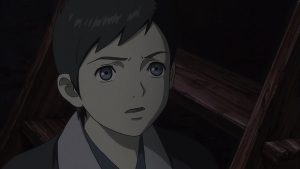 The mountains, with traveler’s huts and wayside guardian statues and crude trails, are a wonderful visual creation. But so is Toumi Village, a stellar example of world-building that draws both on Uehashi Nahoko’s anthropological expertise and Kamiyama Kenji’s direction (and Kawai Kanji’s music for that matter). From the “road’s end rope” of Nahji skulls at the entrance to the details of the dwellings and artworks to the faces themselves, it all feels incredibly real. This is a place where traditions survive in the “modern” world – though even here the storytelling tradition has died with the last storyteller, gone with no one chosen to replace her.
The mountains, with traveler’s huts and wayside guardian statues and crude trails, are a wonderful visual creation. But so is Toumi Village, a stellar example of world-building that draws both on Uehashi Nahoko’s anthropological expertise and Kamiyama Kenji’s direction (and Kawai Kanji’s music for that matter). From the “road’s end rope” of Nahji skulls at the entrance to the details of the dwellings and artworks to the faces themselves, it all feels incredibly real. This is a place where traditions survive in the “modern” world – though even here the storytelling tradition has died with the last storyteller, gone with no one chosen to replace her.
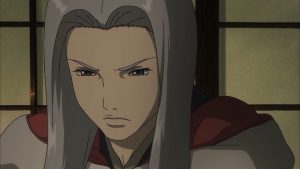 This, of course, is grim news for the trio who’ve taken Chagum all this way to try and learn more about his fate. He’s smart, very smart – he knows Balsa has been hiding things from him, and it’s shaken his trust in her for the first time. There is one villager who knows some of the old stories – Nimka, the young girl who meets the travelers on the trail and immediately recognizes Tanda for his resemblance to his grandfather. She spent time with the old storyteller, and heard tales of the last Nyunga ro Chaga. She relates these, but unfortunately she includes the part where the egg bearer is ripped in two by the La Lunga.
This, of course, is grim news for the trio who’ve taken Chagum all this way to try and learn more about his fate. He’s smart, very smart – he knows Balsa has been hiding things from him, and it’s shaken his trust in her for the first time. There is one villager who knows some of the old stories – Nimka, the young girl who meets the travelers on the trail and immediately recognizes Tanda for his resemblance to his grandfather. She spent time with the old storyteller, and heard tales of the last Nyunga ro Chaga. She relates these, but unfortunately she includes the part where the egg bearer is ripped in two by the La Lunga.
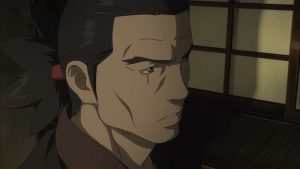 One can’t blame Nimka or the elder for this – they didn’t know who Chagum was – but the effect is explosive to say the least. Strong as he is Chagum is still only an eleven year-old child, and he has his limits. Ripped away from the happy life he’d only just adapted to after being ripped away from his old life, told that his brother was dead, and now learning in graphic terms what’s apparently going to happen to him – it’s not surprising that it’s too much for him to take in. And truthfully this is just the beginning, as both Chagum and Balsa are going to be tested in ways quite different than anything either of them has experienced before.
One can’t blame Nimka or the elder for this – they didn’t know who Chagum was – but the effect is explosive to say the least. Strong as he is Chagum is still only an eleven year-old child, and he has his limits. Ripped away from the happy life he’d only just adapted to after being ripped away from his old life, told that his brother was dead, and now learning in graphic terms what’s apparently going to happen to him – it’s not surprising that it’s too much for him to take in. And truthfully this is just the beginning, as both Chagum and Balsa are going to be tested in ways quite different than anything either of them has experienced before.


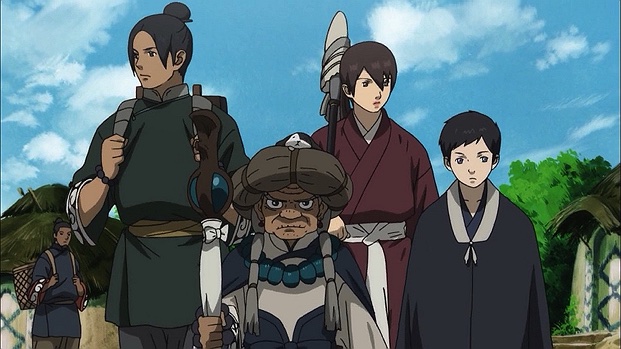
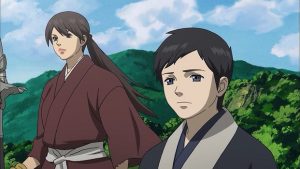

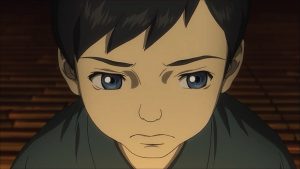
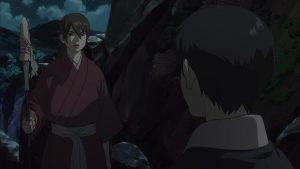
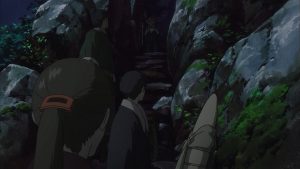
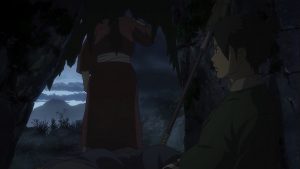

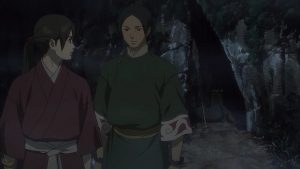

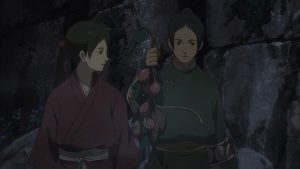

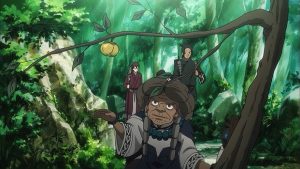
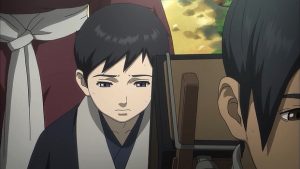
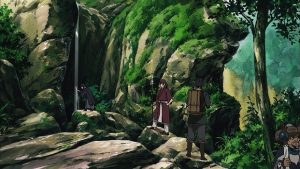
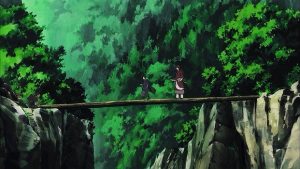
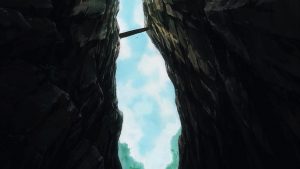

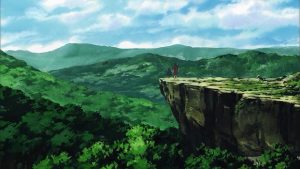
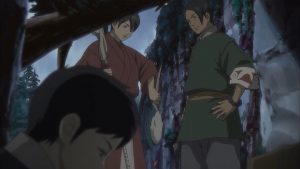
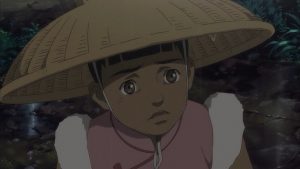
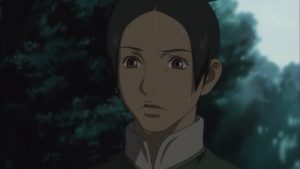
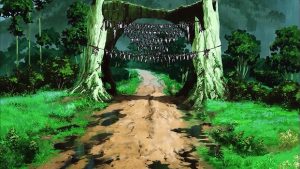
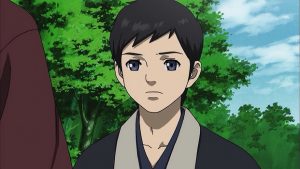
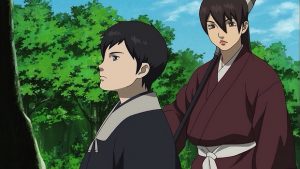
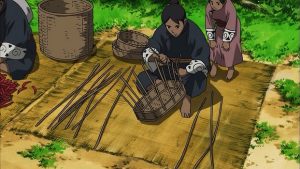
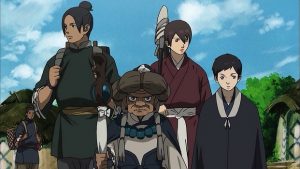
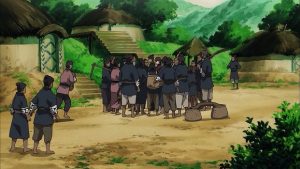
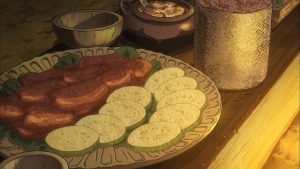
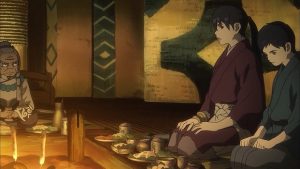
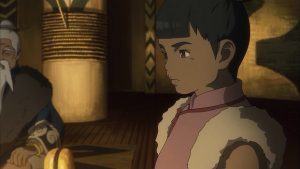
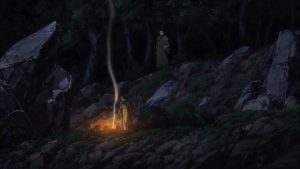
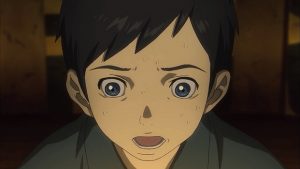

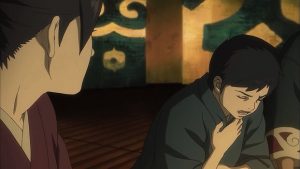
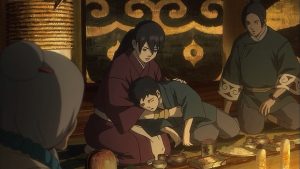
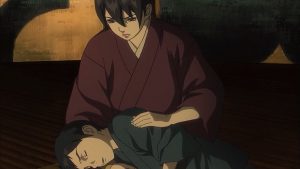
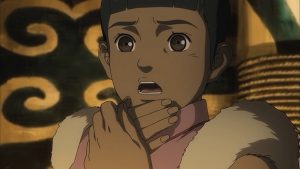



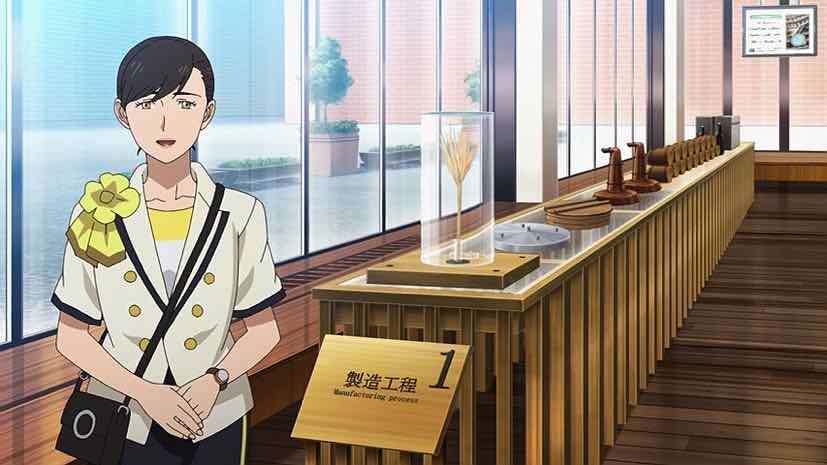
Panino Manino
July 4, 2020 at 10:19 amBalsa behavior is infuriating, she is doing the same she did with Tanda in episode 4 (and I believe in so many other occasions). I can’t put the blame on her father, when a see going to unnecessary lengths to be an ass, even knowing that she is also suffering a bit not wanting to explain the bad things that may happen to him.
Those bird schools at the village’s entrance are placed just at the right height to be necessary for a child do jump, brilliant!
Also, when I started the episode I thought, “this is already episode 18?”. There’s not many episodes left and this felt intriguing. That little arc before the finale feels like it’s whole 6 episodes, it feels so much longer.